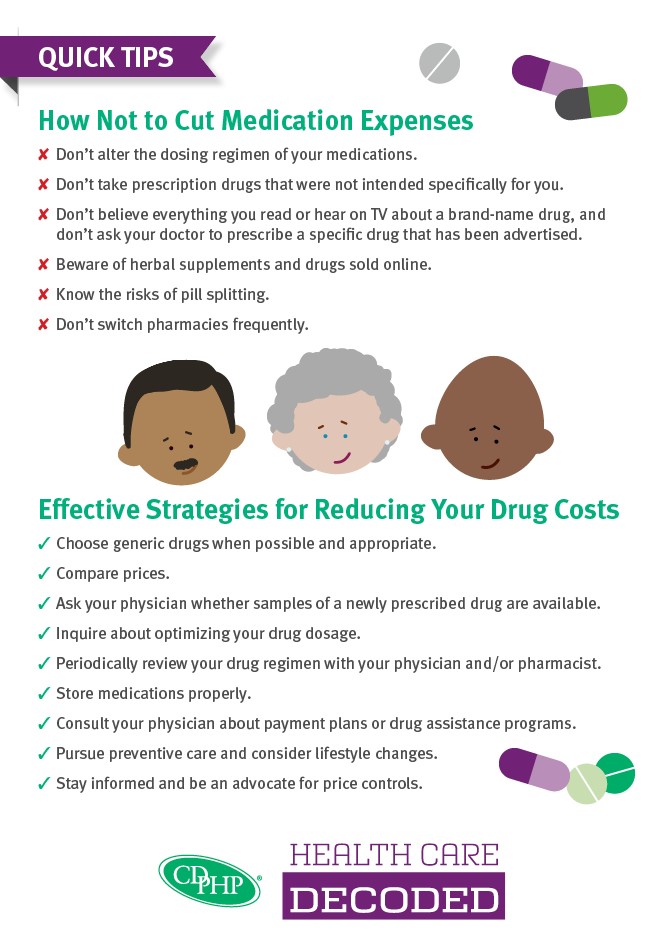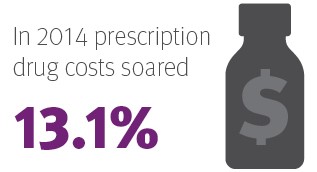How – and How Not – to Save Money on Prescription Drugs

Are you feeling a bigger pinch in your wallet these days when you pick up your prescription drugs? Experiencing sticker shock because the cost of the drug you’ve been taking for years has skyrocketed in recent months?
If so, you’re not alone – and it’s not your imagination. Prescription drug spending is on the rise, and analysts are predicting the trend is likely to continue for the foreseeable future.
In many ways, 2014 was a pharmaceutical “perfect storm” for escalating prescription drug costs, which in the United States, soared 13.1 percent to $374 billion, the highest level of spending since 2001 according to the IMS Institute for Healthcare Informatics. The primary culprits for the increase included costly breakthrough medicines for such diseases as hepatitis C, multiple sclerosis, and cancer; dramatic price hikes for prescription and generic drugs that many believe amount to profiteering on the part of drug manufacturers; and the millions of people who became newly insured through the Affordable Care Act.
As a result, an increasing number of patients – one in five according to some studies – are unable to afford the drugs their physician has prescribed, choosing instead to cut corners by skipping doses or foregoing a medication altogether, often at considerable risk to their overall health. Because these medications are designed to prevent disease or its progression, these practices can have devastating results, resulting in hospitalization and the need for even more expensive treatments.
Short of staying informed about drug costs and advocating for cost transparency from the pharmaceutical industry, you may feel rather powerless to control the spiraling cost of drugs. But there are measures you can take – and some that you shouldn’t – to ensure that you are doing everything you can to rein in your spending on medications.
How Not to Cut Medication Expenses First, let’s take a look at what you shouldn’t do to reduce spending on the medications you take.
- Don’t alter the dosing regimen of your medications. Cutting back on the frequency with which you take a drug can render it ineffective, so there’s no real savings associated with that practice. Always take your medications as directed.
- Don’t take prescription drugs that were not intended specifically for you. If you take a pill that was prescribed for another person, it is not only potentially harmful to you, it is illegal to do so. Moreover, the medication in your friend’s or spouse’s medicine cabinet may have expired, or it may interact with other drugs you may be taking, causing adverse effects.
- Don’t believe everything you read or hear on TV about a brand-name drug, and don’t ask your doctor to prescribe a specific drug that has been advertised. Chances are, there is a less expensive, yet effective, drug available, and the one that is advertised may not be the best choice for treating your condition. In fact, many of those so-called “new” drugs do not provide substantial benefit over their older counterparts, and their side effects may cause serious harm or create the need for even more drugs. That’s the reason why those rapid-fire, “small print” disclaimers about the possible side effects of a new drug may take up more of the ad time than the description of the drug’s benefits!
- Beware of herbal supplements and drugs sold online. Herbal supplements, despite their “natural” tag, are not regulated in the same way that prescription drugs are, so they can pose some risks. In fact, many of them have the potential to cause serious and harmful side effects, especially when combined with other drugs. Likewise, that lack of regulation and the absence of oversight by a health professional are good reasons to avoid ordering drugs online, even if the cost is substantially less. Counterfeit drug sales by rogue Internet-based pharmacies are a booming business, and the drugs they are selling may be fake or expired, or contain dangerous fillers. In fact, 96 percent of more than 11,000 online drug sellers evaluated by the National Association of Boards of Pharmacies (NABP) were not recommended as legitimate sources for medications.
- Know the risks of pill splitting. Some higher-dose medications are nearly the same cost as their lower-dose versions, so you may ask your doctor to prescribe a double-strength drug so you can cut the pills in half. Provided your physician or pharmacist believes it is safe to do so, this may be an acceptable practice if that is the only way you can afford the medicine. However, be aware that many pills cannot be split safely, including capsules, time-released drugs, and those that are specially coated.
- Don’t switch pharmacies frequently. You may be tempted to jump around between pharmacies to get the best deal on your medications, but that practice can jeopardize your health. Pharmacies keep track of your medications and their dosages to minimize the risk of any dangerous interactions between the drugs you are taking. If you are filling prescriptions at multiple pharmacies, critical information can be missed.
Effective Strategies for Reducing Your Drug Costs So what can you do to effectively control your medication expenses? Below is a list of some cost-cutting strategies that you may want to explore:
- Choose generic drugs when possible and appropriate. Although the cost of generic drugs has risen in recent months, they are generally three to four times less expensive than brand-name medications and often just as effective. So if your doctor prescribes a name brand drug, don’t hesitate to ask if a generic equivalent is available. If you’re not sure what a drug will cost, check with your insurance plan. If the drug prescribed for you has no generic equivalent, ask your physician if a similar medication from the same class of drugs could be substituted.
- Compare prices. It often pays to shop around, comparing the cost of a particular drug at local supermarkets, retail stores, independent pharmacies, and through mail order to find the best price for a drug. Additional discounts may apply if you order a 90-day supply of the medication, or your insurer may offer a deep discount program, such as Rx for Less, for generic drugs that are purchased through preferred pharmacies.
- Inquire about optimizing your drug dosage. Consult your pharmacist and/or doctor to find out what drug regimen would be most effective in terms of both cost and simplicity. For instance, if your prescription requires you to take a drug multiple times during the day, a higher once-daily dose may prove to be less costly but equally effective. Or the reverse may be true: Taking a lower-strength medication twice a day could be less expensive. Understanding which way to go can be confusing. Your pharmacist can help you determine the best options.
- Periodically review your drug regimen with your physician and/or pharmacist. If you are taking multiple medications for one or more chronic conditions, it’s a good idea to re-evaluate your drug regimen on a regular basis. There may be less expensive over-the-counter options or alternative non-drug treatments, such as massage, acupuncture, or exercise, that are safe and effective for treating your condition, or you may be taking multiple drugs for the same condition when one drug might suffice. Some insurers, like CDPHP®, offer medication therapy management programs, which can be especially helpful for elderly patients with chronic disease. CDPHP members can also call the single-source referral line — 1-888-94-CDPHP (942-3747) —and ask to schedule a pharmacy consult.
- Store medications properly. Make sure that you are storing your prescription drugs appropriately so their effectiveness or potency is preserved. Some medications need to be refrigerated, others should not be exposed to light, and many drugs deteriorate in the moist, steamy conditions that exist in most bathroom medicine cabinets.
- Consult your physician about payment plans or drug assistance programs. Don’t hesitate to confide in your physician if you can’t afford the drugs that have been prescribed for you. Doctors want their patients to achieve the best level of health possible, so they will often work with you to identify drug savings programs, whether they are state-subsidized, like New York state’s Elderly Pharmaceutical Insurance Coverage (EPIC) program, national programs like the Extra Help Medicare program, or assistance provided directly from pharmaceutical manufacturers.
- Pursue preventive care and consider lifestyle changes. Don’t underestimate the cost advantages of getting preventive care and making healthy lifestyle changes. Doing so can significantly reduce your risk of developing costly chronic conditions – such as heart disease, diabetes, cancer, and depression – and help you avoid the expense of the prescription drugs used to treat them.
- Stay informed and be an advocate for price controls. Rising prescription drug costs are a major threat to affordable, quality health care. The recent drastic increases in the price of specialty and generic drugs are creating difficult decisions for U.S. citizens, many of whom are now forced to choose between putting food on the table for their family and getting the medications they need to regain or preserve their health.
CDPHP is concerned about these unsustainable cost trends. That is why we are working to educate the public and to pressure pharmaceutical companies to justify their drug pricing policies. We want to know what their actual expenditures are for essential research, development, and manufacturing of drugs  versus what they pay for lobbying services, marketing, and administrative overhead. Join us in our efforts to advocate for control of drug costs and sign up to receive the latest news and information on the market forces impacting medication prices. It will require a concerted effort on the part of us all – patients, health care providers, insurers, and drug companies alike – to rein in these runaway costs.
versus what they pay for lobbying services, marketing, and administrative overhead. Join us in our efforts to advocate for control of drug costs and sign up to receive the latest news and information on the market forces impacting medication prices. It will require a concerted effort on the part of us all – patients, health care providers, insurers, and drug companies alike – to rein in these runaway costs.
 The Daily Dose
The Daily Dose

 Adele O'Connell
Adele O'Connell
Comments are closed.